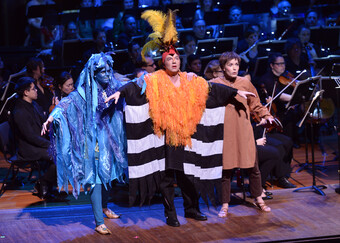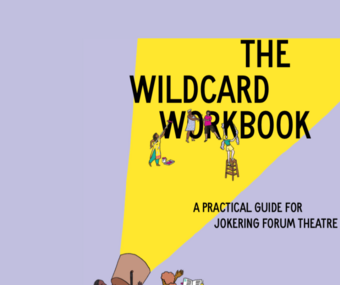Has a theatre instructor ever preached the importance of saying “yes, and” to you? How about “well, the show must go on!” in response to a problem? Or perhaps someone has urged you to “say yes to everything” as career advice? Although a lot of these fundamental teachings are intended to be helpful to aspiring performers and other theatre practitioners, they tend to combine into two, all-encompassing ideas: that the work is more important than the people involved, and “yes” is the only acceptable answer.
There’s definitely some truth to these teachings, and it’s understandable why they’ve been upheld for so many generations. It’s generally well-advised to stay open-minded to opportunities, and accepting them is a great way to build up a network. And as a performer, it can be helpful to be reminded that the artform is bigger than us, and we have a certain level of responsibility to our teammates and the audience.
But what happens when one ventures out to begin their acting career, and things become complicated? Maybe you’re up for a role that involves nudity, but you’re not comfortable with the way that it’s being handled. Or maybe you’ve been offered a contract that should have gone to a member of a marginalized community you are not a part of. Suddenly, “yes, and,” and all the similar philosophies you’ve spent years repeating don’t hold up as well.
Why Saying No is Hard
Why is saying no difficult in the first place? It could have something to do with the way performers are conditioned. A big part of theatre education is not only about the craft, but also about creating an artist that is malleable. The language commonly used in theatre education urges the importance of saying yes and pushing through, as exemplified by “yes, and.” Another example is how learning to take direction is upheld as one of the best skills a performer can acquire, especially when it’s done on the spot without question.
What happens when someone spends formative years of their life in an environment that conditions them to solve most problems by bending and stretching to fit different molds?
This makes sense on a surface level—after all, isn’t taking direction and transforming literally what the job entails? This applies to the craft of acting onstage, but also the politics of casting and networking behind the scenes. It’s normalized for performers to adapt to fit different projects both onstage and off, and it’s easy to see why. It can be wise for artists to embrace versatility so they can be available for a wide variety of work.
But how does that mentality affect someone psychologically over time? What happens when someone spends formative years of their life in an environment that conditions them to solve most problems by bending and stretching to fit different molds? It becomes easy to be seduced by the idea that changing oneself to fit the project is the ideal solution, instead of accepting when something just isn’t working. The act of pushing the limits has been so heavily romanticized that we forget that some limits have the right to exist.
There is also the social pressure to say yes. Theatre is a very tight knit community: if you’re pursuing a career in theatre, odds are most of the people you associate with are also part of the community. Maybe you attend long, daily rehearsals where you work closely with theatre folk, and then come home to roommates who are also performers. In your spare time, you might attend classes to better your craft and support your friend’s projects. Maybe you even live in a city where every server and bartender you encounter when you go out is also involved in the industry.
It becomes even more difficult to say no when those around you have also been conditioned against it as well. This environment provides many opportunities for peer pressure to subtly sneak in—it could look like a dance instructor insisting that concerning dieting habits are normal, or your actor roommate saying they’d kill to book that job that you’re on the fence about. The constant biased input from colleagues, advisors, and those who exist within the theatre bubble can heavily influence what a performer deems as acceptable or not.
There are several other reasons why saying no can feel intimidating as a performer: there’s the competitive nature of the theatre industry, and the fear that if you don’t take a gig, you’ll be replaced and forgotten. There’s also a deep-rooted anxiety about burning bridges in such a well-connected industry, where everyone seemingly knows everyone else. It’s very easy to develop a scarcity mindset, since booking in general is quite difficult and time-consuming. If you turn down this one opportunity, who knows if or when another one will come along? And of course, there’s the dire financial reality of pursuing a career as a performer, and the urge to take just about anything that offers money. When faced with all of this, it’s simple to see why some performers might struggle to consider no as an option.













Comments
The article is just the start of the conversation—we want to know what you think about this subject, too! HowlRound is a space for knowledge-sharing, and we welcome spirited, thoughtful, and on-topic dialogue. Find our full comments policy here
Thank you so much for writing this! As a designer, it got me thinking about how we also get stuck in the "Yes, and..." culture. I wrote my own post with those thoughts here: https://www.emilymccdesign.co…
This is so great, Emily! I’m glad that the ideas resonated. It’s very interesting to hear about how “yes, and” teachings affect other artists within the theatre in addition to performers. Thanks for your perspective!
I took an intimacy class with fight and intimacy director Ted Hewlett in graduate school. He had us play a familiar game: standing in a circle, one participant points to another. The second participant gives them permission to cross to their spot with a "yes" or "go." While the first participant is crossing, the second participant points to a third to ask permission, and so on. I've played this game since I was a child in theatre camp, but Ted introduced a new option: you didn't have to give permission. You could say no. It was really hard at first to recognize my impulses. Do I want to move right now? Do I feel pressure? Do I just want to be a contrarian? I think about that moment a lot as a wakeup call to how we have been trained not to listen to ourselves and automatically say yes
That’s so interesting! I really like that, and I imagine that one specific change would add another layer to the game.
The next time that game comes up I’ll have to implement that. Thanks for your insight!
Hello,
I wanted to start off by saying thank you for writing this article. I appreciate your insight, hopeful outlook, and gentle correction surrounding certain parts of our art form. I hope to read more of your work one day. I am definitely sharing this article.
With gratitude,
Smithers
Thank you so much for the kind words! I’m glad the ideas resonated, and I really appreciate your support.
It's great to read this, we need to keep on this message as there is such an overwhelming amount of pressure instructing us to say yes. In the niche world of clowning, where I work, it drives me crazy, both at the aesthetic/technique level and in the realm of consent and personal boundaries.
I now spend quite a lot of time in my teaching developing new ways of playing and working with "no" in our performance practice. It's such a great creative and personal liberation for many to discover the productiveness of saying "no" as a performing artist, both in your creative work onstage and in your interactions with others generally.
Thanks for this comment, Jon. I've been following you recently as I've just 'discovered' clown and I'm beginning to use it in my corporate training/coaching (plus ,I'm working up a PhD proposal on clowning in the corporate world so I think this important). I struggle with 'yes, and' - 'yes' is only meaningful if 'no' is an option, right? I'd love to find out more about how you are working with 'no'!
Thank you for your insight! It’s so interesting to see how the cultures of different performance disciplines compare. I’m glad to hear that you’re integrating the practice of setting boundaries as a person, an educator, and an artist!